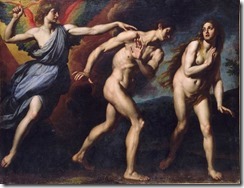Innokenty of Alaska
 “The first man, having been created in the image and likeness of his Creator, had the most vital and close relationship with Him and therefore enjoyed total happiness. God, having created Adam in His image and likeness, endowed him with many of His qualities. The most important of these was immortality. God, being all-just, created Adam sinless and pure. Being all-blessed, He created Adam blessed also, and this blessedness or beatitude was meant to increase in him day by day.
“The first man, having been created in the image and likeness of his Creator, had the most vital and close relationship with Him and therefore enjoyed total happiness. God, having created Adam in His image and likeness, endowed him with many of His qualities. The most important of these was immortality. God, being all-just, created Adam sinless and pure. Being all-blessed, He created Adam blessed also, and this blessedness or beatitude was meant to increase in him day by day.
As the book of Genesis states, Adam lived in the most beautiful garden (named Eden or Paradise), planted by God, and there he enjoyed all the blessings of life. He knew no sickness nor suffering. He feared nothing, and all beasts submitted to him as their master. Adam suffered neither cold nor heat. Although he toiled by caring for the garden of Eden, he did so with pleasure. His soul was filled with awareness of the Divine presence, and he loved his Creator with his whole heart. Adam was always calm and happy and knew no unpleasantness, sorrow, or concern. All his desires were pure, righteous, and orderly; his memory, intellect, and all other faculties were in harmony and were constantly being perfected. Being pure and innocent, he was always with God and conversed with Him as with his Father, and in return God loved him as His own beloved son. In brief, Adam was in Paradise, and Paradise was within him.
If Adam had not sinned, he would have remained forever blessed, and all his descendants would have enjoyed blessedness. It was for this very purpose that God had created man. But Adam, having succumbed to the tempter-devil, transgressed against the law of the Maker and took pleasure in the taste of the forbidden fruit. When God appeared to Adam right after he had sinned, Adam, instead of repenting and promising obedience henceforth, began to justify himself and to blame his wife. Eve in turn blamed the serpent for everything. And so it was that sin became a part of human nature, deeply injuring it because of the lack of repentance of Adam and Eve. The existing communion with the Maker was cut and the blessedness lost. Having lost Paradise within himself, Adam became unworthy of the external Paradise and was therefore banished from it.
After the fall into sin, Adam’s soul darkened: his thoughts and desires became muddled, and hisimagination and memory began to cloud. Instead of peace and joy he met sorrow, agitation, ruination, misery, and woe. He experienced hard labor, poverty, hunger, and thirst. And after years of unsurpassed sorrows, sickly old age began to oppress him, and death neared. Worst of all, the devil, the perpetrator of every evil, obtained through sin the ability to influence Adam and to further alienate him from God.
The whole of nature, which had previously served Adam as a means to happiness, had now become hostile to him. From then on Adam and all his descendants began to suffer from cold and heat and to experience hunger and the effect of changes in climate and environmental conditions. Animals became unfriendly toward people and looked upon them as enemy or prey. Adam’s descendants began to suffer from different diseases, which gradually became more varied and severe. Men forgot that they were brothers and began to fight with each other, to hate, to deceive, to attack and to kill each other. And finally, after all kinds of hard labors and tribulations, they were doomed to die, and, as sinners, to go to Hades and experience eternal punishment there.
No man, even the most talented and powerful, nor all of mankind in unison, could ever restore what Adam lost when he sinned in Eden. What would have happened to us and to all of mankind if Jesus Christ in His mercy had not come to redeem us?”
[ From a sermon : The Way into the Kingdom of Heaven ]
Leave a Reply
You must be logged in to post a comment.